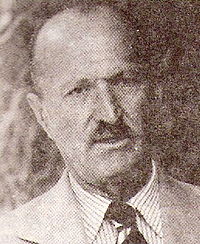Deolindo Bittel
| Deolindo Bittel | |
|---|---|
 |
|
|
Senator for Chaco Province |
|
|
In office December 10, 1989 – September 22, 1997 |
|
| Mayor of Resistencia | |
|
In office December 10, 1987 – December 10, 1989 |
|
| Senator for Chaco Province | |
|
In office December 10, 1983 – December 10, 1987 |
|
| Governor of Chaco | |
|
In office May 25, 1973 – March 24, 1976 |
|
| Lieutenant | Alberto Torresagasti |
| Preceded by | Roberto Mazza |
| Succeeded by | José Zucconi |
| Governor of Chaco | |
|
In office October 12, 1963 – June 28, 1966 |
|
| Lieutenant | Nilson Franchisena |
| Preceded by | Marcelino Castelán |
| Succeeded by | Rafael Torrado |
| Personal details | |
| Born | May 26, 1922 Villa Ángela, Chaco Province |
| Died | September 22, 1997 (aged 75) Resistencia |
| Political party | Justicialist Party |
| Spouse(s) | Mercedes Soto Nora Salas |
| Profession | Notary public |
Deolindo Bittel (May 26, 1922 – September 22, 1997) was a prominent Argentine politician.
Deolindo Felipe Bittel was born in Villa Ángela, a Chaco Province town known for its tannin industry, in 1922 to a farming family of French Belgian descent. He was 9 when he witnessed his father fall to his death into a deep ditch, and was later sent to nearby Esperanza, Santa Fe Province to complete his secondary schooling. Bittel enrolled at the National University of the Littoral, where he received a degree as a notary public in 1945. He married Mercedes Elsie Soto and had a daughter and 2 sons; he later married Nora Salas.
The advent of Peronism in Argentina led Bittel to run on Juan Perón's Labor Party ticket for mayor of Villa Ángela in 1946. The young candidate was elected, though the results were annulled by the then-conservative Chaco authorities. Following Chaco's 1951 designation as a province, voters in 1953 elected the Peronist ticket of Governor Felipe Gallardo and his running mate, "Chacho" Bittel. The September 1955 coup d'état against Perón brought an end to the Gallardo-Bittel tenure, as well as to the province's designation as "Provincia Presidente Perón."
President Arturo Frondizi's lifting of the 1956 electoral ban on Peronism led to nationwide Peronist candidacies in the 1962 elections, and of 14 provinces whose governorships were in play, they carried 10 - including Bittel's victory in Chaco. These elections, however, also led to Frondizi's overthrow by the anti-peronist military, leaving governor-elect Bittel unable to take office. New elections were called for 1963, for which Bittel agreed to an alliance with his former adversaries, the Conservative Party; elected with conservative running mate Nilson Franchisena by over 12% over the centrist UCR-P, he was duly sworn in as governor on October 12.
...
Wikipedia
